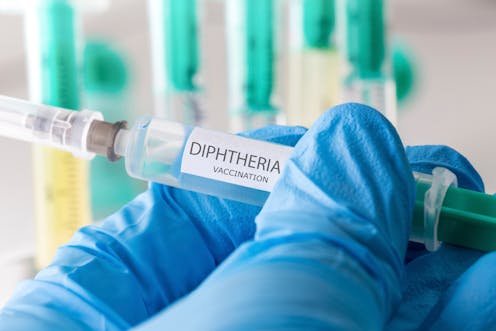
Diphtheria has been reported in Nigeria: more than 790 confirmed cases as of 30 June 2023. There were 83 deaths among the confirmed cases between May 2022 and June 2023. Infectious diseases expert Dr. Oyewale Tomori explains what diphtheria is, its symptoms and how people can protect themselves against the disease.
What is diphtheria?
Diphtheria is a disease caused by bacteria called Corynebacterium diphtheriae. The bacterium usually affects the mucous membranes of the nose and throat, causing respiratory and skin infections.
Left untreated, diphtheria toxin spreads through the tissues of the nose and throat as well as tissues of the heart and nerves. It can be very hard to breathe and swallow. In severe respiratory disease, there can be damage to the heart and nerves.
What are the common symptoms and how bad can they be?
Symptoms of respiratory diphtheria usually begin 2 to 5 days after a person becomes infected. Signs may include weakness, fever, sore throat, and swollen glands in the neck. A thick, grey coating in the throat or nose can also appear.
Skin infections caused by C. diphtheriae typically consist of shallow ulcers (sores) and do not result in severe disease.
With treatment, most people with diphtheria survive, but recovery is often slow.
Diphtheria is fatal in about 5% to 10% of the cases. Rates of death are higher in children under age five or adults older than age 40.
The lethality and symptoms of diphtheria are caused by the exotoxin produced by the bacterium. Different strains of C. diphtheriae cause differences in lethality.
How is it spread?
People with diphtheria can spread the bacteria to others through the air when they cough or sneeze, or if others come into contact with their infected wounds or contaminated objects.
Asymptomatic transmission and chronic infection are also possible.
How can people protect themselves?
Diphtheria is extremely rare in countries with widespread vaccination against the disease. Many countries with low vaccine coverage rates and limited healthcare still experience high rates of diphtheria.
Getting vaccinated is the best way to protect against diphtheria. Diphtheria vaccines are combination vaccines. These vaccines protect against diphtheria and tetanus, and some also protect against pertussis (whooping cough). People of all ages need appropriate combination diphtheria vaccines.
You should limit contact with people who have diphtheria disease who can spread it through coughing and sneezing. Avoid touching contaminated wounds or objects.
How serious is the current outbreak in Nigeria? How often has Nigeria experienced diphtheria outbreaks?
It is a serious outbreak. According to the Nigeria Centre for Disease Control and Prevention, Nigeria reported 1,064 suspected cases and confirmed 389 cases from 21 states between May 2022 and March 2023. During the same period, 62 deaths were recorded, giving a case fatality rate of 15.9%. Sadly, only 60 (15.4%) out of 389 confirmed cases were fully vaccinated with a diphtheria toxin-containing vaccine.
The outbreak is not waning, as in June 2023 alone, Nigeria reported 439 suspected cases and confirmed 160 (36.5%) from four states and Abuja, the capital. No death was recorded among confirmed cases.
During the 11 year period between 2007 and 2017, Nigeria did not report any case of diphtheria to the World Health Organisation. However, in 2018 and 2019 the country reported 1,870 and 2,289 cases respectively.
What should the Nigerian government be doing to control the disease?
According to the UNICEF/WHO joint estimates, Nigeria’s Diphtheria-Tetanus-Pertussis (DTP3) coverage has been consistently lower than 80%, ranging from 29% to 62% between 2000 and 2022.
Globally, more than half (over 50%) of the children who remain unvaccinated for DTP3 are concentrated in just eight countries: Nigeria, India, the Democratic Republic of Congo, Ethiopia, Pakistan, Angola, the Philippines and Indonesia.
This is why Nigeria continues to report diphtheria outbreaks, long forgotten by most countries in the world. If Nigeria is to control the disease and prevent future outbreaks, it must increase and sustain the level of childhood vaccination to 90% and above- far above the current levels of less than 60%.
Nigeria must also enhance epidemiological surveillance to ensure early detection of diphtheria cases. The country must put in place an effective and efficient laboratory service for the rapid and reliable confirmation of cases, as well as the identification of toxigenic C. diphtheriae.
There must be early and prompt reporting of cases, timely management and treatment of cases, and adequate supply of diphtheria antitoxin. Finally, contacts must be followed up efficiently to limit the spread of the disease.
Oyewale Tomori does not work for, consult, own shares in or receive funding from any company or organisation that would benefit from this article, and has disclosed no relevant affiliations beyond their academic appointment.
This article was originally published on The Conversation. Read the original article.







